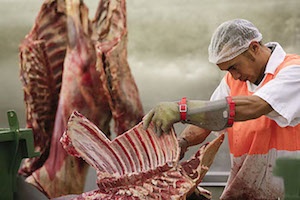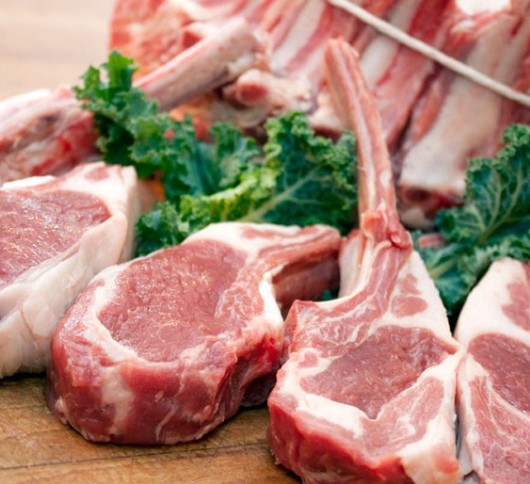Production of sausages and meat products according to Halal standards has increased in Chechnya

All products of the meat processing plant have a certificate for the Halal standard, which is issued by the relevant committee of the Chechen Republic, that is, strict quality control is carried out at each stage of production, right down to the use of herbs and spices. This means that there is an authorized specialist at the plant who monitors compliance with Islamic requirements in the production of products. For example, animals brought to production must be raised according to appropriate standards. And before slaughtering them, employees read a prayer. The products
themselves should not contain components prohibited for consumption by Muslims ( pork , blood, etc.). But most importantly, in the end, products produced according to Halal standards are of higher quality and environmentally friendly, which leads to high demand for them. This is especially felt, of course, in the republics of the North Caucasus, where Islam is practiced. By the way, the word “halal” itself comes from Arabic and means “allowed, permissible.” Compliance with Halal standards allows the Argun meat processing plant to actively develop production, and its products are in demand in the republic. Although, according to the director of the enterprise, Gelani Etiev, deliveries are also made to other regions. “The geography of our sales is wide - Moscow and the Moscow region, the republics of the North Caucasus, as well as Crimea and the northern regions,” he says. - We used to work with retailers, but, unfortunately, this is becoming more and more difficult to do every time. There is a strict system of obligations here: you need to supply products in the required volume. For example, they suddenly order 500 units of beef tongue at the price list, but how can they provide such a quantity at once? Fines are imposed for failure to comply with the conditions. However, we are present in all retail outlets in the region. The Argun meat processing plant was founded back in 1964 and during the Soviet period produced up to 70 tons of meat and 25 tons of sausages per day. However, two Chechen military campaigns, in the 90s and 2000s, virtually destroyed the entire infrastructure of the meat processing plant, and only in 2011 the enterprise began to be revived. - A few months ago we opened a workshop for the production of stewed meat: the canned food contains only natural ingredients - 50 grams of fat, 300 grams of beef, allspice, bay leaf and salt
, - says Nurid Yusupov, chief technologist of the Argun meat processing plant. - In March next year we plan to put into operation a workshop for the production of raw smoked sausages, we will purchase special equipment for the same sudzhuk. This dry-cured delicacy requires special smoking conditions, humidity, and is dried using starter cultures (biobacteria) for 21 days. Due to the low moisture content of the sausage, it has the longest shelf life - four months. Now we have to transport the products for “drying” to Zelenokumsk in the Stavropol region.
The director of the meat processing plant, Gelani Etiev, recalls how, in the first years of restoration, employees loaded 200 kilograms of products into a simple Moskvich every day and delivered them to stores. The assortment consisted of only a few types of sausages, “varenka” and semi-smoked sausages. But now a line of 79 items has been developed, but in fact only about 65 are produced. It all depends on orders and demand.
The company currently employs 68 people, and after the new workshop is put into operation, the meat processing plant will be able to provide an additional 12 jobs.
The production process begins with deboning the animal carcass. Looking at a strong worker who separates meat from bones with a special knife, you understand how much skill is needed in this matter. His movements are precise, like a surgeon’s, and an impressive part of the carcass seems to have lost weight, so deftly does he turn it over on the table, remove tendons, cartilage, and lymph nodes. A deboner cuts up to 2.5 tons of meat per day. Of course, not everyone can physically withstand the stress - and the point is not only that you have to stand on your feet the entire shift, you also have to bring the carcass, and the knife itself has a decent weight. There are no specialized technical schools in the region where they teach the profession of meat deboning, but there is mentoring - a beginner applying for this position will have an internship under the guidance of an experienced master.
At the next stage, the meat is ground, salted, kept for a day in a storage room, and then minced meat is prepared. By the way, the equipment in the workshops is German, so after the introduction of economic sanctions, it turned out to be very difficult to obtain the appropriate consumable units or new parts for it. But the company found a solution by arranging supplies of similar spare parts from Asian countries or producing them independently.
- Sausage casings also have to be purchased. For example, fibrous is better suited for semi-smoked, it is thinner and fits better. We order it from neighboring countries, but the polymer shell is, as a rule, domestically produced,” admits Gelani Etiev. - Meat loaves are kept in a sedimentation chamber to dry and restore the structure of the minced meat, and then, depending on the category, the sausage is either boiled or smoked in thermal chambers.
The demand for halal products has turned out to be an upward trend, which has recently allowed to increasemeat production not only at enterprises in Chechnya, but also in North Ossetia and Dagestan. .
According to analysts, the Russian market for halal products accounts for approximately five percent of the total food retail volume. At the same time, interest in halal is also associated with healthy eating trends . According to Rosselkhoznadzor , exports of halal products from Russia in 2022 increased by almost 50 percent - by the end of last year it exceeded 129 thousand tons. 90 percent of these supplies were poultry meat and offal.






















































